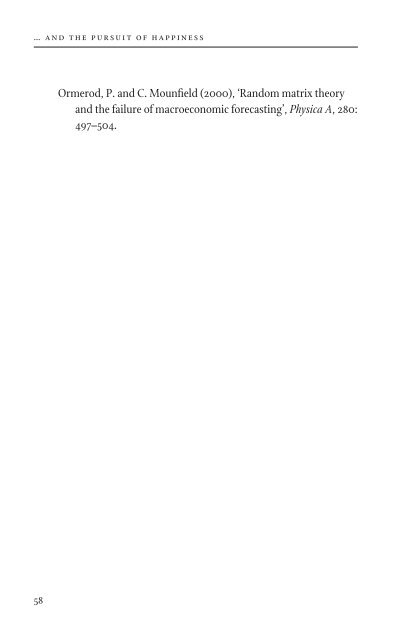… and the Pursuit of Happiness - Institute of Economic Affairs
… and the Pursuit of Happiness - Institute of Economic Affairs
… and the Pursuit of Happiness - Institute of Economic Affairs
Create successful ePaper yourself
Turn your PDF publications into a flip-book with our unique Google optimized e-Paper software.
<strong>…</strong> <strong>and</strong> <strong>the</strong> pursuit <strong>of</strong> happiness<br />
Ormerod, P. <strong>and</strong> C. Mounfield (2000), ‘R<strong>and</strong>om matrix <strong>the</strong>ory<br />
<strong>and</strong> <strong>the</strong> failure <strong>of</strong> macroeconomic forecasting’, Physica A, 280:<br />
497–504.<br />
3 Subjective WellBeing, Income,<br />
<strong>Economic</strong> Development <strong>and</strong><br />
Growth<br />
Daniel W. Sacks, Betsey Stevenson <strong>and</strong><br />
Justin Wolfers<br />
Introduction<br />
Does economic growth improve <strong>the</strong> human lot? 1 Using several data<br />
sets which collectively cover 140 countries <strong>and</strong> represent nearly<br />
all <strong>of</strong> <strong>the</strong> world’s population, we study <strong>the</strong> relationship between<br />
subjective wellbeing <strong>and</strong> income, identifying three stylised facts.<br />
Firstly, we show that, within a given country, richer individuals<br />
report higher levels <strong>of</strong> life satisfaction. Secondly, we show that<br />
richer countries on average have higher levels <strong>of</strong> life satisfaction.<br />
Thirdly, analysing <strong>the</strong> time series <strong>of</strong> countries that we observe<br />
repeatedly, we show that, as countries grow, <strong>the</strong>ir citizens report<br />
higher levels <strong>of</strong> satisfaction. Importantly, we show that <strong>the</strong> magnitude<br />
<strong>of</strong> <strong>the</strong> relationship between satisfaction <strong>and</strong> income is roughly<br />
<strong>the</strong> same across all three comparisons, which suggests that absolute<br />
income plays a large role in determining subjective wellbeing.<br />
These results overturn <strong>the</strong> conventional wisdom that <strong>the</strong>re<br />
is no relationship between growth <strong>and</strong> subjective wellbeing.<br />
In a series <strong>of</strong> influential papers, Easterlin (1973, 1995, 2005a,<br />
2005b) has argued that economists’ emphasis on growth is<br />
misguided, because he finds no statistically significant evidence<br />
1 This chapter is adapted from Sacks et al. (2010). In turn, that paper clarified <strong>and</strong><br />
simplified many <strong>of</strong> <strong>the</strong> findings originally described in Stevenson <strong>and</strong> Wolfers<br />
(2008).<br />
58 59












